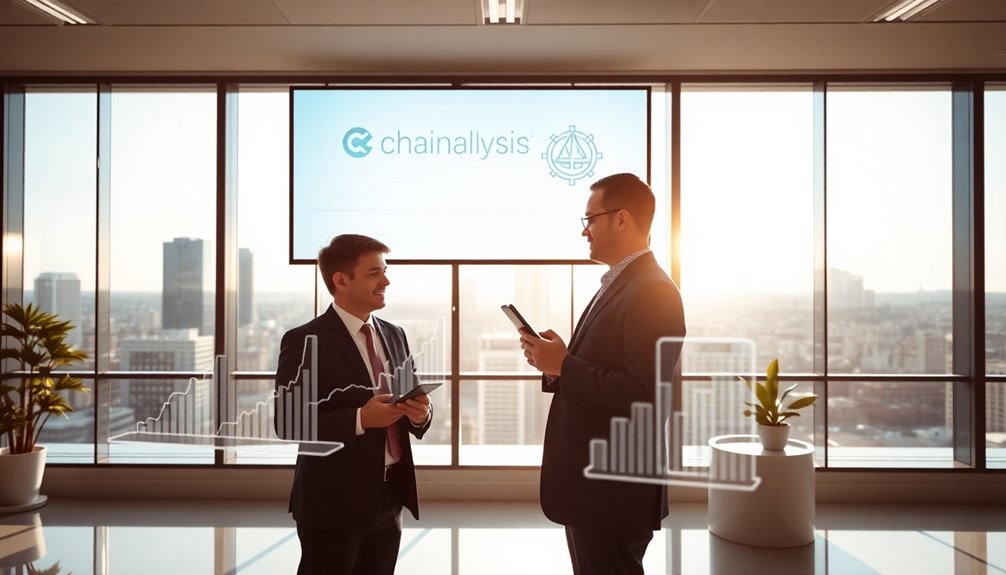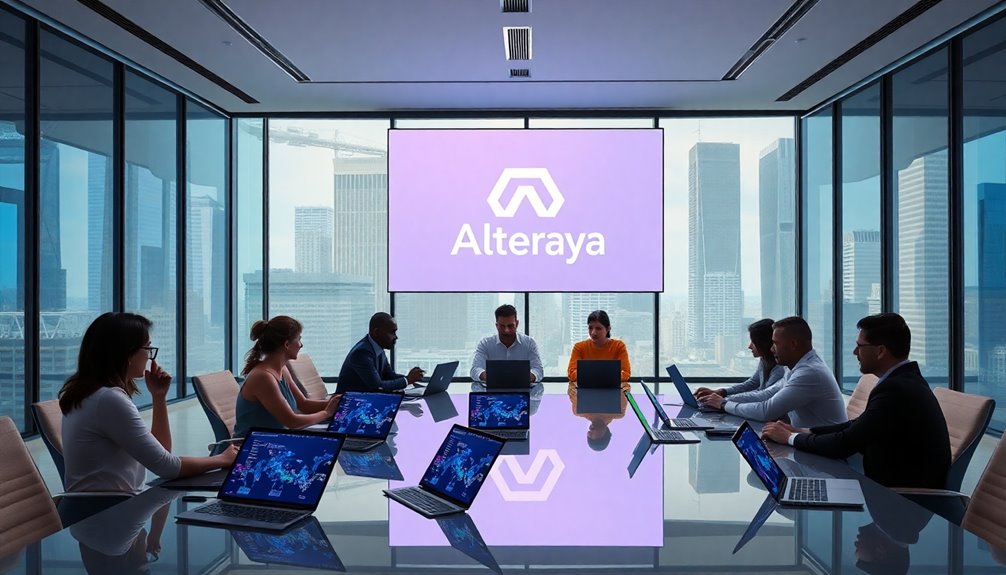Chainalysis is stepping up its anti-fraud initiatives by acquiring Alterya, an innovative AI-powered fraud detection firm. This acquisition allows you to benefit from real-time fraud protection and enhanced Know Your Customer (KYC) processes. Alterya already monitors $8 billion in transactions each month and has flagged $10 billion in scams during 2024 alone. By integrating blockchain data with AI, Chainalysis aims to protect 100 million users globally and secure billions in transactions. This strategic move not only enhances your security but also addresses growing regulatory pressures in the crypto space. There's much more to discover about these developments.
Key Takeaways
- Chainalysis acquired Alterya to enhance its real-time fraud protection capabilities using AI-powered fraud detection technology.
- Alterya currently monitors $8 billion in transactions monthly and identified $10 billion in scams in 2024.
- The integration aims to improve KYC processes by combining blockchain data with advanced AI analytics.
- This acquisition is part of Chainalysis's goal to protect 100 million users and billions in transactions worldwide.
- The enhanced fraud detection will help businesses comply with increasing regulatory requirements in the crypto space.
Chainalysis Enhances Fraud Prevention

Chainalysis is stepping up its game in fraud prevention by acquiring Alterya, a cutting-edge AI-powered fraud detection firm. This acquisition enhances your ability to identify and combat illicit transactions. Alterya monitors over $8 billion in transactions monthly and has already detected $10 billion sent to scams in 2024. By integrating Alterya's technology with Chainalysis's blockchain data platform, you gain real-time fraud protection and improved KYC processes. This powerful combination helps crypto exchanges reduce fraud, minimize scam-related disputes, and streamline manual operations. Ultimately, you're safeguarding 100 million users globally and protecting billions of dollars in transactions. With the launch of Operation Spincaster, you can navigate the crypto landscape with greater confidence and security.
Regulatory Changes Impacting Crypto

As the crypto landscape evolves, regulatory changes are becoming increasingly significant for users and businesses alike.
You'll need to navigate new Treasury regulations mandating Form 1099-DA reporting starting in 2025, impacting centralized exchanges and potentially decentralized operators too.
The Financial Accounting Standards Board's updates require fair value measurement of crypto assets, enhancing disclosure obligations.
Moreover, the OECD's Crypto-Asset Reporting Framework sets new standards for cross-border tax reporting. Institutional adoption of digital assets is increasing, which further emphasizes the need for robust regulatory frameworks.
On a state level, jurisdictions like Wyoming, Texas, and Florida are leading with progressive legislation.
The EU's MiCA regulation also shapes digital asset oversight.
With increased supervision and the establishment of dedicated crypto policy roles, staying compliant is crucial for your crypto ventures.
Crypto Volatility and Investment Shifts

In today's rapidly changing landscape, crypto volatility is reshaping investment strategies and priorities.
You'll notice that increased access to crypto through public listings is attracting a broader range of investors. With companies like MicroStrategy included in major indices, index funds and ETFs are more likely to invest in crypto firms, enhancing legitimacy. As institutional buying grows and Bitcoin ETFs potentially launch, the market's stability could improve. You might also see the rise of stablecoins like USDC reinforcing the U.S. dollar's dominance. Additionally, advancements in Ethereum's Layer 2 technologies and the use of AI in crypto are paving the way for innovative investment opportunities, signaling that the cryptocurrency sector is maturing and becoming an integral part of the financial ecosystem. Furthermore, the launch of spot Bitcoin ETFs has significantly increased capital inflows, indicating a shift towards greater institutional confidence in the market.
Corporate Blockchain Integration

With businesses increasingly recognizing the potential of blockchain technology, corporate integration is transforming operations across various industries.
You'll find that blockchain enhances data security through digital signatures and immutable records, ensuring all transactions are traceable and verified. This transparency reduces disputes, speeds up reconciliations, and supports effective supply chain management. Additionally, blockchain offers enhanced transparency and clear reporting, allowing for better oversight and accountability in corporate operations.
By automating tasks with smart contracts, you can lower operating costs and improve efficiency, eliminating unnecessary intermediaries. Moreover, the instant execution of processes accelerates operations, improving customer experiences and overall business agility.
Ultimately, integrating blockchain not only secures sensitive data but also provides a clear advantage in maintaining accurate records and reducing administrative burdens, paving the way for a more efficient corporate landscape.
Election Campaign Funding Dynamics

Understanding the dynamics of election campaign funding is crucial for grasping how political power is shaped in the U.S. Over 65% of funding comes from political action committees (PACs), totaling $5.6 billion, while candidates themselves have raised over $2.0 billion.
From January 2023 to April 2024, campaigns collected around $8.6 billion, with a notable surge of $5.0 billion since November 2023—a 137% increase. This substantial increase in fundraising underscores the growing role of PAC contributions in shaping campaign strategies.
Spending trends reveal that PACs accounted for 56.5% of expenditures, spending nearly $2.2 billion. As you analyze these patterns, consider how large individual contributors and party committees influence races, particularly in presidential and Senate contests, while the dual structure of public funding offers another layer of complexity in campaign finance.
Emerging Technologies in Fraud Detection

Political campaigns, much like financial markets, face increasing risks of fraud, prompting a surge in the adoption of emerging technologies for detection.
You're likely familiar with AI and machine learning, which analyze vast amounts of data to spot subtle patterns indicative of fraudulent activity. These technologies excel at recognizing anomalies and adapting to new fraud tactics through continuous learning. Predictive analysis can also identify potential threats before they materialize, enhancing the overall security framework. Blockchain technology enables decentralized control over transaction records, adding an additional layer of security against fraud.
They can even prevent market manipulation by cross-referencing trader activities. Real-time monitoring enhances your ability to catch irregularities instantly, while automation frees up resources for more strategic tasks.
With firms like Chainalysis integrating advanced AI solutions, detecting and preventing fraud in various sectors is becoming more effective and efficient, ultimately safeguarding your interests against emerging threats.
Conclusion
In wrapping up, Chainalysis's acquisition of Alterya signals a bold step toward bolstering fraud prevention in the crypto realm. As regulations evolve and volatility persists, the need for robust solutions is more critical than ever. With corporate blockchain integration on the rise and emerging technologies reshaping fraud detection, you're witnessing a transformative wave. The dance of innovation and security is just beginning, and it's clear that staying ahead in this landscape is essential for the future of crypto.









